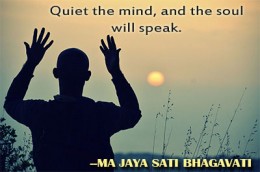What is the difference between the ego and self?
What is the difference between the ego and self?
Seems to me most articles dealing with the ego, just start out with everyone knowing what the writer means. Same for articles on self. What is the difference?Eric, I do not like the word, "ego." Never have.
I googled the meaning of ego: "a person's sense of self esteem, self importance, self worth, self confidence"
and
self: "Ego, I, oneself, character, soul, spirit, mind
I can only think of examples in my own life. I have a relative whom the rest of my family considers to be 'self centered'..."It's all about HER," they say.
Then when I am with women discussing a man we all know, I have heard them say to me, "He has a huge EGO. He is full of himself."
So, my question would be, what is the difference between someone being full of her/himself and self centered?
My take: A self centered person has LOW self esteem, wants to receive compliments, accolades, and, if not gets angry or upset if not receiving a lot of attention from others.
A egotistical person has TOO much self confidence, and struts around like a peacock, emulating a 'dig me' attitude.
If I am correct, I think the book A Course In Miracles talks a lot about the ego. - like it is something we have to battle with all the time.
This is my short version of an answer and only MY opinion. Another good question. Thank you. Sparklea
Sparlea, it is good to hear from you. I can tell you are doing well and that is good. I googled it also. It seems that ego really just is, Too much is bad. Too little is bad. But it does seem just about the same as "self". Thank you.
Very hectic, behind in everything...Husband very ill New Years Day, landed in hospital with blood infection. 14 days of IV antibiotics at Infusion Center, doing well...hoping to get back on track. Holidays hectic too.

I like to say that having confidence in ones self is knowing that you are capable of achieving any goal at any time or accomplishing anything you set your mind to. I say ego or arrogance is thinking you are better than people. Kinda go by the adage; compete against yourself and became better, compete against others and become bitter.
So you think that when we say ego it means the negative portion of the self?
Not necessarily. We all have an ego. But confidence in ones self is different than showing everyone your ego.
Josh, that is why I am asking this question -- what do you mean by showing your ego. What is the ego that is different than the self? I know we have words like egotistical that have negative stuff attached. But why?
Showing your ego would be posturing or pea cocking. Letting everyone know how good you are. The self is knowing that you can achieve great things without having to tell everyone how great you are.
So Ego is the outer self, which we show off. So I gather ego is part of the self in your way of thinking.
- tsmogposted 10 years ago
0
As alluded to there will be definitions for both. At sometime each will settle upon something even if somewhat. I use to work in a corporate environment where 'ego' was tossed about rigidly and loosely. Frankly, with honesty, the only definition in that environment I cared about was that of the owner of the company. It was necessary.
That said, I always get lost when ego is used. Freud says the 'ego' is the 'self' with its components ego, id, and superego. However, there is disagreement with definition and meanings for ego with psychology:
** Alfred Adler (1870-1937)
** Carl Jung (1875-1961)
** Karen Horney (1885-1952)
** Erik Erikson
Then there is the teachings of Buddha and other forms of enlightenment including philosophy. In that case it is contrast with thinking seeking future with a presence of 'now'. The dissolving of 'ego' leads toward enlightenment. And, lest we not forget the Greek word, eimi, meaning I am . . . I exist. A maze may form for 'ego' while with most each is attributed to as 'self'.
I discovered less confusion for me when I was led by something to study Symbolic Interactionism. There I learned of a concept with the 'I' and the 'Me' with the developing self as proposed by George Herbert Mead. It may be simply explained as "the 'me' is the socialized aspect of the person, the 'I' is the active aspect of the person".
In other words perhaps allegorical one discovers my 'I' with this shared writing, while never knows my 'Me'. A consideration with that theory is those two of my 'self' are always in conversation or communicating. The 'I' is somewhat allowed to share 'Me' socially with reservation.
Symbolic Interactionism develop that further with another theory known as The Looking Glass Self from Charles Horton Cooley. In essence that shares 'a person's self grows out of society's interpersonal interactions and the perceptions of others. The term refers to people shaping their self-concepts based on their understanding of how others perceive them."
For example in a conversation one-on-one one shares their 'Me' with their 'I' and evaluates and assesses the interaction with self with 'Me'. 'Me' converses with 'I' for the next interaction initiated by 'Me' with 'I' as the spokesperson.
How does 'ego' fit into that. Keeping it brief associate Freud's 'ego' of Ego with the 'I'. For 'me' one will have to look at his concept of censorship.
The 'self' is fun isn't it.Wow Tim that is excellent. I kind of like the Mead concept. I definitely interact with me. Me and I love to converse. I always loved Cogito Ergo Sum. And I find the Great I Am intriguing. So I have an ego. And it is part of self.
Hopefully, I can find out from the answers on this form, for, I truly do not know. I feel an "inflated ego" is just confidence that has crossed that fine line between confidence and arrogance.
Yes Dana, it seems that really for the ego to mean something negative you have to put a modifier on it. I was wondering why it gets such a bad wrap when we all have one.

I think ego is how we (want) to be perceived by the world for "comparison" sake. We want to be the VIP or stand out.
The ego (demands to have competition) or some means of measuring one person is "better or doing better than those around them" in order to feel good about them self.
Ego wants to distinguish itself by besting others.
The "self' on the other hand is more interested in evolving to a higher plane, self-discovery, attempting to make sense of the purpose their life, finding inner peace and happiness. Life is a (personal) journey.
In a free capitalist society it's a challenge to find the balance.I am beginning to think that we use ego to mean that part of self that is for everyone else. And in that I think we can make real progress with our self by tempering it both rationally and spiritually. I am so mellow I might need to boost my ego ;-)
You have a point, Eric. Some tend to use the word interchangeably and loosely. The Self, capital 'S' is the Absolute, the 'self' small 's' is related to the ego. I, me, mine; the lower self: fear, doubt, anger, resentment ... and also related to the mind. It is the nature of the mind to analyse, to chop things up, to separate.
Ego is of the mind and that is where the feelings of superiority and inferiority comes from. Generally it is resentful; likes to dominate ...
Ego has tremendous drive and can be useful for creativity, like being a number one footballer or music star ...but the very thing that puts it on a pedestal, may be the very thing that pulls it down. With Ego, humility is either lacking or hidden.
The Soul is part and parcel of the Higher Self but still separate. It merges when the Soul is God-Realised or Self-Realised and becomes One, the Knower of All, yet retaining its individuality. So a Christ will be a Christ, a Buddha a Buddha and so on. In its Highest Form, The Self is the Absolute Silence, but again, it is from this Silence that Creation emerges in this ever-transcending game divine. Salaam!The self is a product of what C. G. Jung described as individuation. Something like all the things you could be or perhaps even an ideal self. But what's interesting and I have yet to understand this about Jung's work is that he mentions mandalas as representations of the self. "All paths lead to the self" he quotes. This doesn't seem to be consistent with his description of the divine individual. He eludes to the fact that we should strive toward an ideal but it isn't obvious if he acknowledges that we seldom turn out that way. It is unequivocal that not all paths could lead to an ideal. But perhaps we might characterize ourselves as meandering our way toward an ideal but is never guaranteed that we find our way there. The center is always somehow out of reach.
And, of course, the ego is merely a collage of different personalities in the image of what we would like others to believe we are. Often described as a mask.Jessie thank you for that insight. It would seem to me that we have to drop the notion of progression. A timeline of graduating toward a higher understanding makes no sense. Jung seems to me to be closing the box. Ideal or not ideal.
Related Discussions
- 9
Are you self- directed or self centered?
by Judy Specht 11 years ago
Are you self- directed or self centered?While taking a economics class the professor was talking about self- directed vs self-centered. In a free market people are assumed to be self-directed. The example he used was Mother Theresa. She was self-directed because she could...
- 18
What the difference between having a high level of self-confidence and being con
by Grace Marguerite Williams 12 years ago
What the difference between having a high level of self-confidence and being conceited?
- 26
What is the difference between a religious person and spiritual person?
by tsmog 8 years ago
What is the difference between a religious person and spiritual person?Where that question leads to is can a spiritual person be a Christian? In other words, does a Christian have to be religious?
- 5
What is the difference between confidence and self esteem?
by Sandria Green-Stewart 16 years ago
What is the difference between confidence and self esteem?
- 10
Are you self-centered? Is that good or bad? How do you handle it?
by Joana e Bruno 13 years ago
Are you self-centered? Is that good or bad? How do you handle it?
- 14
Are Humans Selfish or Cooperative in Nature
by Grace Marguerite Williams 12 years ago
This thread was inspired by an answer (answer 51) by illustrious hubber, Mr. John Holden, on the thread Republicanism vs Utopianism. Do YOU beieve that the nature of humans is selishness or cooperativeness towards his/her fellow humans? There are some proponents who assert that...













